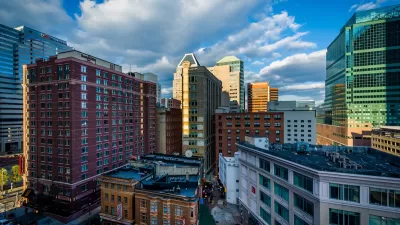An op-ed describes the choice by many cities to prioritize residential projects in old industrial spaces as short-sighted and potentially unjust.

Andy Cook writes an op-ed for Next City that makes an impassioned plea in support of the industrial land uses that are giving way to luxury residential developments in cities like Baltimore and many others around the United States. "If Baltimore and cities like it want to build a future that offers opportunities for everyone," writes Cook, "we need to hold the line on light industrial zoning, and think hard about ways we can rebuild our base of working class jobs, and ultimately, the pathways they offer back into the middle class."
Cook offers the example of Union Craft Brewing—a home-grown Baltimore success story looking for a new location for expansion. The problem: the city of Baltimore has been prioritizing residential housing over industrial space during the current urban boom. Cook provides context:
Between 2005 and 2015, Baltimore down-zoned over 400 acres of industrial land to residential or commercial categories. During that same time, it added only 67 acres of new industrial zoning, all at the former site of the Hollander Ridge public housing project, demolished in 2000.
Noting that "once a city gives up an industrial area, it never comes back," Cook builds the case that Baltimore's focus on residential adaptive reuse projects only benefits an "upwardly mobile generation of suburbanites seeking a more urban lifestyle." Meanwhile much of Baltimore's population is mired in unemployment and underemployment.
FULL STORY: Manufacturing Isn’t Dead; Stop Zoning Like It Is

Study: Maui’s Plan to Convert Vacation Rentals to Long-Term Housing Could Cause Nearly $1 Billion Economic Loss
The plan would reduce visitor accommodation by 25,% resulting in 1,900 jobs lost.

Alabama: Trump Terminates Settlements for Black Communities Harmed By Raw Sewage
Trump deemed the landmark civil rights agreement “illegal DEI and environmental justice policy.”

North Texas Transit Leaders Tout Benefits of TOD for Growing Region
At a summit focused on transit-oriented development, policymakers discussed how North Texas’ expanded light rail system can serve as a tool for economic growth.

How Community Science Connects People, Parks, and Biodiversity
Community science engages people of all backgrounds in documenting local biodiversity, strengthening connections to nature, and contributing to global efforts like the City Nature Challenge to build a more inclusive and resilient future.

Alabama: Trump Terminates Settlements for Black Communities Harmed By Raw Sewage
Trump deemed the landmark civil rights agreement “illegal DEI and environmental justice policy.”

Dear Tesla Driver: “It’s not You, It’s Him.”
Amidst a booming bumper sticker industry, one writer offers solace to those asking, “Does this car make me look fascist?”
Urban Design for Planners 1: Software Tools
This six-course series explores essential urban design concepts using open source software and equips planners with the tools they need to participate fully in the urban design process.
Planning for Universal Design
Learn the tools for implementing Universal Design in planning regulations.
City of Santa Clarita
Ascent Environmental
Institute for Housing and Urban Development Studies (IHS)
City of Grandview
Harvard GSD Executive Education
Toledo-Lucas County Plan Commissions
Salt Lake City
NYU Wagner Graduate School of Public Service



























